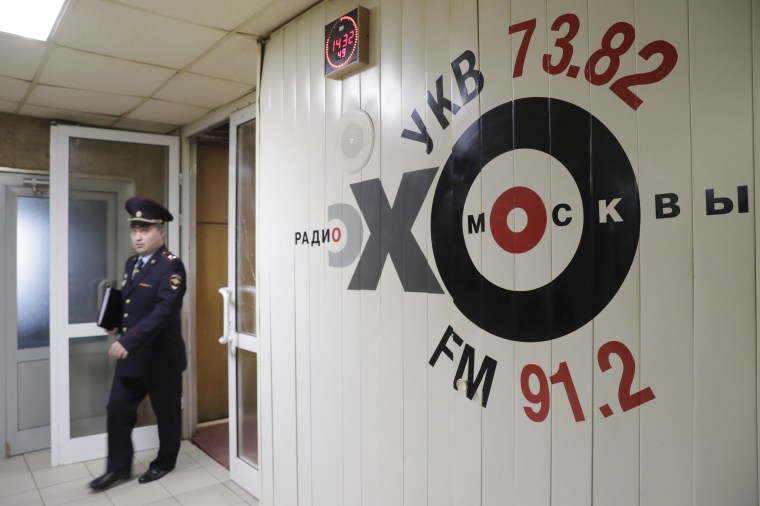Russia’s silencing of Ekho Moskvy over its Ukraine war coverage marks an end to an iconic radio station with a brave history dating back to the late Soviet era.
Even in the heady final years of glasnost (“openness”), hiding truth from the Soviet public was pretty easy for the country’s Communist leaders. When hardline Communists sought to overthrow glasnost architect Mikhail Gorbachev in August of 1991, for example, they ordered many newspapers shut, sent censors into other newsrooms and deployed tanks to Gosteleradio, the massive Soviet broadcast headquarters in Moscow. No need to block social media or the Internet; they didn’t exist yet.
During the frightening hours of that coup attempt, a handful of editors put together an underground paper in Moscow, and a small band of journalists who worked at Gosteleradio snuck a daring story onto the air, making clear that the men trying to take power were not “saving the fatherland,” as they claimed, but staging a military coup.
And then there was Ekho Moskvy. Founded just one year earlier by some veterans of Soviet radio, Ekho hit its journalistic stride with its independent street reporting on the resistance to the coup, centered on Boris Yeltsin. Authorities loyal to the coup leaders tried, more than once, to block Ekho’s transmissions. But somehow, miraculously, the station kept popping back on the air, giving Muscovites vital bulletins of truth to combat the steady flow of disinformation on official media.

When the coup collapsed on the third day, Ekho began a long run as one of Russia’s leading independent news outlets. Its format mainly featured talk shows, some hosted by journalists who came of age professionally during the glasnost years — Sergei Parkhomenko, Yevgenia Albats and Alexei Venediktov, the station’s longtime editor-in-chief. They interviewed a range of voices, including world leaders for whom Ekho became a necessary stop when in Moscow. In times of protest, such as the street demonstrations that began in the wake of 2011 elections that kept Vladimir Putin’s party in office, Ekho was a go-to source for updates.
It was also a near-constant irritant to the Kremlin, seemingly under threat each time Putin’s government began a new crackdown on Russia’s scrappy independent journalists. One such period came in 2008, when Russia sent troops into Georgia. New Yorker editor David Remnick described how an Ekho program, With Their Own Eyes, provided “sober, balanced accounts from battlefield reporters” in the former Soviet republic.. Ekho’s Georgia coverage also included discussion shows with guests ranging from one “who waved the extreme-nationalist banner, to a severe critic of the Kremlin,” wrote Remnick. “Putin was not amused by Echo’s rounded coverage of the war.”
But Ekho survived 2008’s round of repression, just as it maneuvered its way through other crackdowns that seemed to put independent journalism on life support in Russia. It did so with Venediktov at the helm, sometimes stirring controversy within independent media circles or facing down sexual harassment claims.
After each period of Kremlin repression, a few independent journalists would regroup into new institutions, using new tactics (such as locating administrative offices outside of Russia) to protect themselves from Moscow’s pressures. Last year, that tactic showed vulnerability when Russia began tagging dozens of independent outlets as “foreign agents,” a label authorized by Russian law that must be carried by the outlet on all of its content. The label does not, per se, put a newsroom out of business, but it frightens away advertisers and includes onerous reporting requirements.

Dozhd TV, Russia’s last independent channel, was already branded a foreign agent when it began comprehensive coverage of the Russian invasion last week. On Tuesday, Dozhd and Ekho were both ordered off the air by Russian authorities, and access to their websites was blocked inside Russia, for supposedly issuing “information calling for extremist activity” and “deliberately false information” about the Russian military. Dozhd quickly suspended broadcasts, and editor Tikon Dzyadko, who left the country, told CPJ this week “we need time to think, and regroup. I can’t say how, or in what format, or when, we will resume work.
After Tuesday’s order, Ekho – owned by Gazprom Media, the media arm of Russian energy company Gazprom — continued its programming online. But on Thursday its board of directors voted to liquidate the radio channel and the Ekho website, according to a Telegram message from Venediktov. The channel’s YouTube site is now also blank except for the message: “This channel is not available.”
Some of Russia’s few surviving independent outlets warned followers this week that they, too, expect more Kremlin efforts to block domestic access to their reporting. Meduza, an independent site headquartered in Riga, Latvia and deemed a “foreign agent” by Russia, sent readers instructions on how to download its app and sign up for news updates, in case its website is blocked inside Russia. Similarly, iStories, an investigative site launched in 2020, published an advisory explaining how to get VPN services and find its reporting on social media. Russian authorities, the site said, “want the citizens of our country to receive only one point of view.” But “No matter what, we will continue to work and tell you the truth.”
For years, analysts have puzzled over the question: why were Ekho and a handful of other outlets allowed to survive in Putin’s Russia, when so many other independent newsrooms were suppressed. Some said Venediktov was particularly adept at negotiating with the Kremlin and keeping Ekho just this side of media red lines. Others suggested the Kremlin wanted to be able to tell its critics: “See, we do have independent journalism.” If that indeed was ever a message Putin wanted to convey, it’s now become just another Kremlin point of disinformation.
